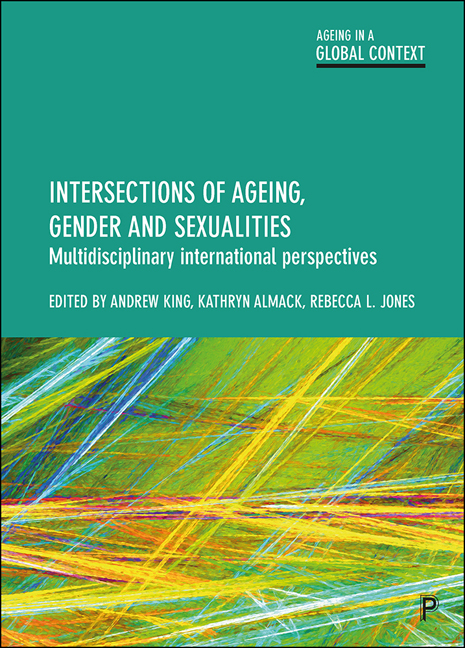Introduction
Published online by Cambridge University Press: 27 April 2022
Summary
There are strong associations, both culturally and sociologically, between ageing, health and well-being. Moreover, multiple research studies have indicated that the health and well-being of older people intersects with gender and sexuality, and that disparities are observed based on majority/minority status and other inequalities. The three chapters in this section all take those issues as a starting point for exploration.
Chapter Twelve, by Mark Hughes, explores the intersection of ageing, gender and sexualities by examining quantitative studies of the health and well-being of older lesbians, gay men and bisexual (LGB) people. Hughes notes that intersectional studies that employ quantitative methods are rare, despite the possibility that quantitative studies have for uncovering, at a broad level, the sorts of structural-level inequalities that intersectionality theory identifies as of central importance. In the chapter, Hughes synthesises data from six large-scale studies, conducted in Australia, the UK and the US, while simultaneously noting that it is important when drawing conclusions from quantitative research to be conscious of methodological limitations. Indeed, Hughes emphasises that much of the research synthesised in the chapter takes identity categories as taken-for-granted variables, although he also makes recommendations that more intra-categorical intersectionality, the differences within and between older LGB people, could be captured.
The following chapters in this section of the book then focus on specific groups of older men. Chapter Thirteen focuses on those with so-called ‘erectile dysfunction’ and in Chapter Fourteen, gay and bisexual men living with prostate cancer.
In ‘Questioning the sexy oldie: masculinity, age and sexuality in the Viagra era’, Raffaella Ferrero Camoletto examines shifts in older masculinity, from the ‘sexually retired’ to the ‘sexy oldie’, in an era dominated by Viagra and the medicalisation of sexual potency in later life. Ferrero Camoletto uses data from a research project she conducted in Italy, which explored how medical experts, in dealing with their ageing male patients’ sexual problems, both adopt and question currently available narratives of ageing, gender and sexualities. As such, the chapter shows how medical experts, including urologists, sexual counsellors and endocrinologists among others, use their authority to create ideas about ‘respectable’ sexuality in later life for heterosexual men.
- Type
- Chapter
- Information
- Intersections of Ageing, Gender and SexualitiesMultidisciplinary International Perspectives, pp. 189 - 190Publisher: Bristol University PressPrint publication year: 2019

